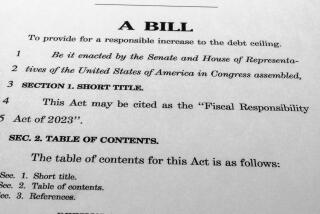The House : Tax Reform
By a 292-136 vote, the House passed and sent to the Senate a historic bill (HR 3838) that radically changes the U.S. tax code. America’s new tax system would take full effect in 1988, lowering the top individual tax rate to 28% and the top corporate rate to 34%. The great majority of individuals would owe less in taxes and the typical corporation more because the bill eliminates a host of breaks that have benefited businesses and wealthy individuals. About 6 million working poor people would pay no income taxes.
Perhaps the bill’s most fundamental change is that, by stripping the tax code of most of its preferential provisions for narrow interests, it seeks to direct capital away from shelters that retard national economic growth and toward the free market. The idea for investors will be to use the code to make profits rather than avoid taxes.
Supporter Lynn Martin (R-Ill.) said: “If we do not seize this opportunity, we will ensure the final and permanent victory of the special interests. The tax code will forever be their domain.”
Opponent Bill Frenzel (R-Minn.) said, “We just do not want tax reform at a cost that inflicts too much pain and too much suffering on our economy.”
Members voting yes favored the bill.
How They Voted Yea Nay No vote Rep. Badham (R) x Rep. Dannemeyer (R) x Rep. Dornan (R) x Rep. Lungren (R) x Rep. Packard (R) x
Budget Cutting
By a vote of 309 for and 106 against, the House passed and sent to conference with the Senate a bill (HR 5300) to slice $15.1 billion from the projected deficit for fiscal 1987, which will begin Wednesday. The conference is expected to produce a bill lowering the anticipated 1987 deficit to within the $154-billion ceiling permitted by the Gramm-Rudman budget law.
Lawmakers thus will have sidestepped across-the-board cuts that Gramm-Rudman mandates when Congress and the White House cannot meet deficit targets. Few members relished voting on such cuts with Election Day around the corner.
This so-called “reconciliation bill” meets the 1987 target not by structural change such as a tax increase but by imposing several one-shot revenue hikes, spending cuts and accounting tricks.
For example, it raises most of its money by selling assets such as Conrail and government loan portfolios, and it employs bookkeeping gimmicks such as making fiscal 1987 revenue-sharing payments in the final days of fiscal 1986 and thus swelling the 1986 deficit.
Members voting yes supported the bill.
How They Voted Yea Nay No vote Rep. Badham (R) x Rep. Dannemeyer (R) x Rep. Dornan (R) x Rep. Lungren (R) x Rep. Packard (R) x
Pesticide Control
By a 214-121 vote, the House adopted an amendment to prohibit states from exceeding federal standards in regulating the pesticide content of food bound for market. The vote established the supremacy of federal tolerance levels for chemical residue on food, if the pesticide was tested and registered by the U.S. Environmental Protection Agency after April, 1985.
It occurred as the House passed and sent to the Senate a major overhaul (HR 2482) of the federal Insecticide, Fungicide and Rodenticide Act, which regulates about 600 pesticide ingredients used on farms, in industry and in the home.
Many pesticides cause cancer in heavy doses. In part, the new legislation requires pesticides now on the market to be retested and re-registered by the Environmental Protection Agency by 1995.
Growers and the food industry favor a uniform federal policy over conflicting state regulations that they say would disrupt interstate commerce.
But many environmentalists argued that, to protect the public health as well as states’ rights, states should be able to be tougher than the federal government in regulating pesticides.
Members voting yes wanted federal standards to supersede state standards in controlling pesticides.
How They Voted Yea Nay No vote Rep. Badham (R) x Rep. Dannemeyer (R) x Rep. Dornan (R) x Rep. Lungren (R) x Rep. Packard (R) x
More to Read
Get the L.A. Times Politics newsletter
Deeply reported insights into legislation, politics and policy from Sacramento, Washington and beyond. In your inbox three times per week.
You may occasionally receive promotional content from the Los Angeles Times.










